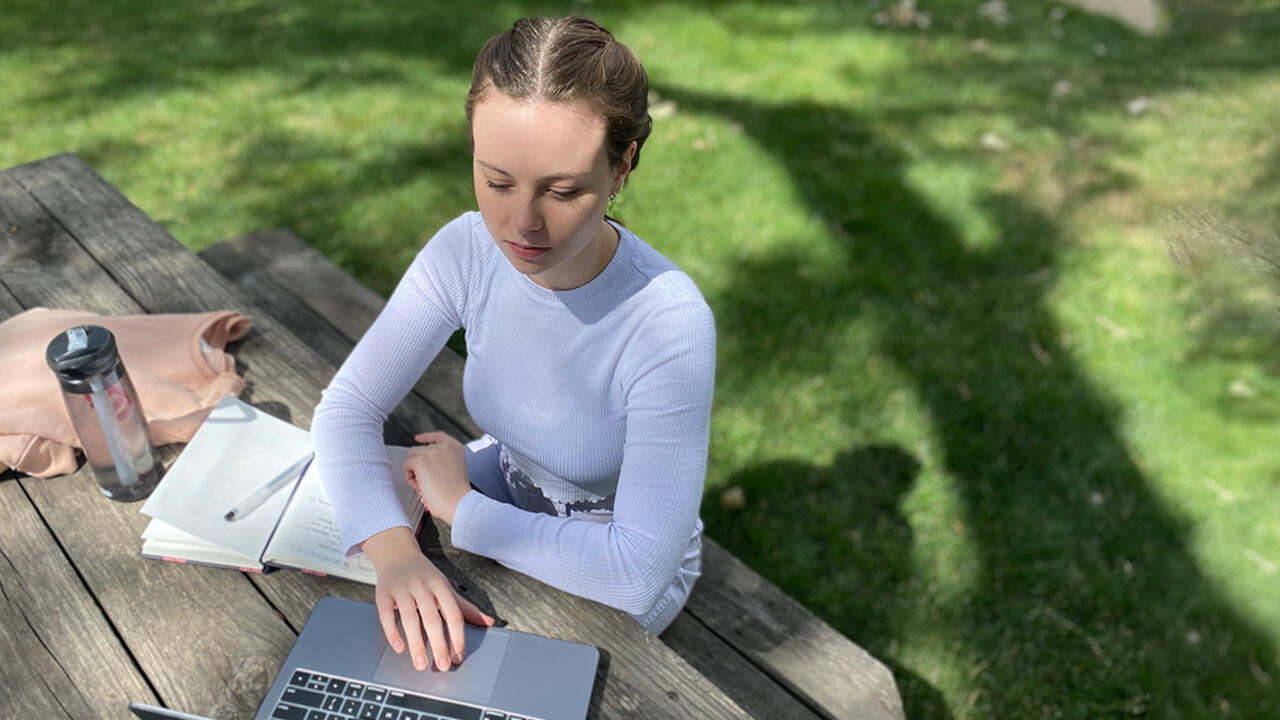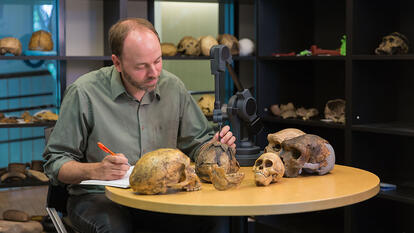
Through Civic Engagement, One Student’s Efforts to Address Mass Incarceration
Six months before Wellesley pivoted to remote operations and distance learning as a result of the COVID-19 pandemic, Sophie Dowdy ’21 was already thinking about leaving campus for the spring semester, although for very different reasons. It was the fall of her junior year, many of her friends were preparing for semesters abroad, and Dowdy was interested in pursuing her own journey: a five-month-long internship with the National Prison Project (NPP), a department housed within the national branch of the American Civil Liberties Union (ACLU) in Washington, D.C.
“I wanted to take an opportunity to do something new, to throw myself in the deep end, and practice in the real world things I’d been learning in the classroom,” she said. “The National Prison Project resonated very deeply with what I wanted to be doing.”
Almost immediately upon joining the NPP in its D.C. headquarters, Dowdy was performing support work on many of its long-term class action lawsuits, which largely focused on improving conditions in jails, prisons, and detention centers across the United States. She quickly discovered it was necessary to take the long view and see hope in the small changes such sustained action made possible.
“These were lawsuits that spanned decades, and would make incremental improvements,” she said. “You have to believe in that to do that work, and you have to believe that what you’re doing is going to make meaningful change.”
As jails, prisons, and detention facilities became many of the worst hotspots around the country for the spread of COVID-19, Dowdy’s responsibilities shifted to include pushing for the release of individuals who were at high risk from the spread of COVID-19.
“A lot of work we were already doing became all the more urgent. As things ramped up with COVID, there was this focus on getting people out who were being incarcerated or detained, who would very likely die if they got COVID, and very likely get COVID if they remained in custody.”
Dowdy found that NPP’s office environment helped sustain her belief in its mission. “They had an instant support network,” she said about the staff. “Everyone was so kind and willing to talk, which is so important when you are doing stuff that for the most part can be pretty demoralizing and upsetting.”
“I wanted to take an opportunity to do something new, to throw myself in the deep end, and practice in the real world things I’d been learning in the classroom.”
Sophie Dowdy ’21
In addition to assisting with ongoing litigation, Dowdy spent hours watching security footage in jails and prisons to ascertain whether facilities were complying with the stipulations of settlements brought about by NPP lawsuits. She tracked press coverage and ran social media accounts for staffers working to end solitary confinement and highlight the deep cruelty and injustice of immigration detention. Dowdy also corresponded regularly with incarcerated individuals on behalf of the NPP. They would write to register complaints about the lack of adequate mental health and medical care in the facilities where they were being incarcerated, issues that increased in urgency over the course of her internship as the pandemic spread across the United States.
The conditions described in the letters were eye-opening. “The lack of basic sanitation and medical care was deeply shocking,” Dowdy said. “I think what made them so upsetting is that it was so deeply personal and so clearly systematic. It was just one after another after another.”
Dowdy’s interest in decarceration took root during her first semester at Wellesley. Born and raised in London, Dowdy arrived on campus with an awareness of the U.S. prison system that had been shaped by documentaries such as 13th, shows such as Orange Is The New Black, and books like The New Jim Crow: Mass Incarceration in the Age of Colorblindness. “Those reference points kind of informed me when, in my first semester, I saw an email from Civic Engagement advertising their volunteer program at South Middlesex Correctional Center (SMCC),” Dowdy said. “I was like, okay, that sounds like something I might be interested in.”
Dowdy started volunteering at SMCC twice a week. The role helped her feel more connected to Wellesley. “(Civic Engagement) was the first place I found community on campus,” Dowdy said, “and my time at SMCC was a huge entry point into concepts that I was later able to engage with academically.”
At SMCC, Dowdy helped facilitate a book club, as well as a professional development series that sought to help incarcerated individuals develop interview skills and other abilities they would need upon release. She found the work and its challenges rewarding and meaningful.
“I think the thing that was really important to me and other members of the book club was building a community space where women at SMCC could relax and be themselves. They weren’t being watched, there were no correctional officers in the room, and we could all enjoy each other’s company and our shared enjoyment of reading.”
As Dowdy delved deeper into her experience at SMCC, it began to shape her course of study at Wellesley. “The deeply arbitrary cruelty (of incarceration) was incredibly unsettling to me,” Dowdy said. “We don’t have to treat people that way.”
Dowdy’s time volunteering within SMCC inspired her to take Race, Gender, and the Carceral State with Jennifer Musto, assistant professor of women’s and gender studies, in her sophomore year. “That class makes it hard to walk away not thinking that the ways we punish people are fundamentally wrong,” Dowdy said. The following year, she took Prison Nation: The Carceral State in America, with Laura Grattan, associate professor of political science. “That class was really meaningful for me in developing what I believed and the reasoning behind it.” Dowdy, a political science major with a minor in women’s and gender studies, asked Grattan to advise her on her thesis this coming year, on a topic directly informed by her internship with the NPP.
“Partially in response to COVID, many people are advocating for so-called ‘nonviolent,’ low-level drug offenders to be released, without realizing that creating that binary between ‘violent’ and ‘nonviolent’ is dangerous,” Dowdy said, describing the idea at the heart of what she plans to write. “It legitimizes the use of incarceration as a system of control. Historically, similar racialized binaries have helped build up the apparatus of mass incarceration that we currently have.”
She is still reflecting on all that she learned during her time in D.C. and how it might apply both to her thesis and to the work she would like to undertake following graduation. “I learned that being able to mitigate some degree of harm on an individual level was really important to me,” Dowdy said. “What I found so meaningful was being able to make a tiny difference. To help people feel heard, to let them know that someone is out there listening and is trying to do their best to improve things.”



